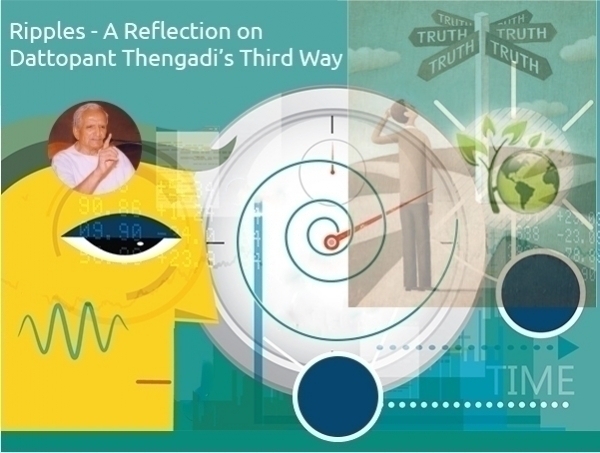Ripples A Reflection On Dattopant Thengadi's Third Way Part 58: On Revolution V
30 Aug 2022 10:00:17
I have been reflecting in my own way on Dattopant Thengadi Ji's Third Way. I present these small "ripples" that it has caused in my mind in a series. I am glad it has found its resonance in many thinking minds alike. I hope the readers have read the earlier article in the series before moving ahead.

(On Revolution- The paper submitted at a meeting of the National Executive of Bharatiya Majdoor Sangh in 1976)
From the time the word 'revolution' was first used to this day, every violent revolution first seizes power from the existing ruling class, then starts the struggle for power among themselves. ( Reference Milowan Djilas from the book ' The imperfect society ') Of course dictators have been trying to muzzle the discordant voices by even eliminating them. Even the communist countries have the similar examples to offer. Dattopant notes that this is an integral part of violent revolutions.
He refers to the book ' On revolution' by Hannah Arendt (1906–1975, was one of the most influential political philosophers of the twentieth century. Born into a German-Jewish family, was forced to leave Germany in 1933, lived in Paris for the next eight years, working for a number of Jewish refugee organisations, In 1941 she immigrated to the United States, soon to became part of a intellectual circle in New York, held a number of academic positions at various American universities until her death)
She observes that 'devising a new form of government and the durability of the structure turn into opposites. A 'revolution' fails to provide permanent and enduring institutions. And 'freedom' becomes the first casualty. Is this the price to be paid? Freedom ought to be the aim of any revolution,even the violent one.
If this the criterion then most of the revolutions don't fall short of it, opined Dattopant.
Non-violent form of revolution has 'soul-force' as their main weapon. Of course End is not supposed to justify the Means.( violent means are not accepted at all) For it, the ultimate truth is the defeat of the oppressor and this end motivates all. Incidental failures don't discourage them. Physical eradication of the enemy is not sought after.
Mass education is an inevitable aspect. It occurs with struggle. Simple gestures define mass education. Yogi Aurobindo calls it 'passive resistance, Lokmanya tilak gave 'Chatuh- sutri', Swadeshi movement, Boycott of Foreign Goods, National Education and Swarajya. Mahatma Gandhi gave the powerful weapon of 'Satyagraha' which is a non-violent defiance of the strong. It is followed by many at different levels. It is the freedom of soul.(Civil disobedience)
Disobedience becomes a duty in some circumstances,states Yogi Aurobindo. Even Milowan Djilas concludes that violent methods are not inavitable,the history confirms it. Such rules are not considered by all as their own. People need to have active participation,he too recognised the importance of mass education and mass involvement. Leaders need to organise themselves with the people. They are parteners, they don't own the people. This, he thinks may eliminate the possibility of dictatorship.
M N Roy, one of the Indian Marxists, who is known to be a new humanist later, describes the process of mass education: " It may be a long way but if it be the only way, then it is also the shortest one".
This is the last write -up. It is always better to read the original text. Many references given by Dattopant need to be read in detail. Reading the book is no less than enlightenment. Many might have found the reflections of his thoughts in many present situations. One is tempted to read some books, he referred to, as they portray the reality very effectively. Fortunately, the book 'Third Way' was refered to by Shri Ranga Hari Ji ( a senior pracharak of RSS) in one of his recent addresses which caused tremendous curiosity, a divene intervention I would be tempted to describe it. I am indebted to all the readers,they in a way kept me going.